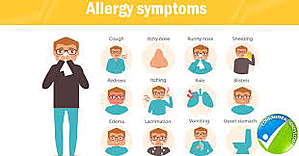It’s that time of the year again. Warmer weather and sunny skies beckon all to enjoy the outdoors, from picnics to hikes to even walks around the block just to enjoy this perfect season. Trees are blooming, flowers are popping back up from the ground, birds are chirping – and pollen is running amuck on your sinuses.
In the words of Winifred Sanders from the movie Hocus Pocus, “Oh, look. Another glorious morning. Makes me sick!” While springtime is beloved by plant, animal and human alike, there’s hardly a person out there who isn’t affected by allergies to some degree. And some are affected so severely that their sleep behavior suffers as well.
Allergies, the irritation and inflammation of the nasal passages caused by airborne allergens, can sometimes cause disruptions in sleep patterns that are not too different from sleep apnea. Nasal congestion blocks airways, causing the sleeper to have interrupted sleep throughout the night. This constant interruption can lead to snoring and daytime fatigue and sleepiness. Sounds familiar, right?
Sleep apnea, similarly, is the condition where breathing pauses for 10 seconds at a time throughout the night. This continual pausing is caused either by the brain’s miscommunication to the respiratory system or, more commonly, the throat muscle’s constriction blocking the sleeper’s airways, leading to constant sleep interruptions and snoring.
But with such closely related symptoms, how can you tell when your snoring and disrupted shut-eye is caused by sleep apnea or just seasonal allergies, and what can you do about it? Here are the differences and similarities between the two conditions, the symptoms associated with each of them, and what can be done to treat them for a more restful night’s sleep.

According to MedlinePlus.gov, allergic rhinitis (also known as “hay fever” or “seasonal allergies”) is “a diagnosis associated with a group of symptoms affecting the nose. These symptoms occur when you breathe in something you are allergic to, such as dust, animal dander, or pollen.”
Symptoms:
After exposure to these allergens, either immediately or developed later, symptoms can include:
- Itchy nose, mouth, eyes, throat, skin or any area
- Problems with smell
- Runny nose
- Sneezing
- Watery eyes
- Stuffy nose due to nasal congestion
- Coughing
- Clogged ears and decreased sense of smell
- Sore throat
- Dark circles under the eyes
- Puffiness under the eyes
- Fatigue and irritability
- Headache
Treatment:
To reduce the effects of allergies during the day, you can take over-the-counter antihistamines such as Benadryl or Claritin, or a decongestant like Mucinex or Sudafed. For a more immediate treatment that doesn’t involve medication, you can always use a saline nasal spray and then message VapoRub onto your chest. If nothing else seems to work, you can always ask your doctor about the option of receiving allergy shots. These shots can help you feel better for a long time. But, you should know about the cost of allergy shots without insurance. It’s important to talk to your doctor about this so you can make the best choice for you. They can give you advice and help you understand everything you need to know.
At night, however, consider investing in a hypoallergenic pillow that won’t trap pollen, dust or other allergen irritants in its fibers. You should also consider purchasing a humidifier to moisten the air in your bedroom that can treat any dry sinuses and cracked lips (from breathing through your mouth), as well as soothing any other respiratory conditions. If you already have a humidifier, then be sure to change the water regularly.

What it is:
Caused by either a brain function (Central Sleep Apnea) or a collapse and block in your airways (Obstructive Sleep Apnea), sleep apnea is “a common disorder that causes your breathing to stop or get very shallow. Breathing pauses can last from a few seconds to minutes. They may occur 30 times or more an hour.”
Symptoms:
Along with constant breathing pauses, symptoms can include:
Loud snoring (though not all snoring is apnea-related)
Frequently waking up at night
Constant daytime fatigue
Chronic morning headaches
High blood pressure
Experiencing irritability, depression and/or mood swings
Being overweight/obese
Treatment:
The first step to treating sleep apnea is to do a sleep study with your local sleep experts. Then, after a diagnosis confirming it is indeed sleep apnea, they will be able to recommend the best solution to treat it.
The most common (and most known) recommendation could involve BiPAP, APAP, ASV or CPAP therapy, requiring you to invest in a specialized machine to help keep your airways open and involuntary muscles to continue breathing. Purchasing an oral device such as a tongue-retaining mouthpiece could also help keep your airways open, while a more serious yet permanent solution could include surgery.
Other suggestions that are less therapy-focused could be needed lifestyle changes, such as weight loss and a healthy diet, or purchasing a new pillow to support the head for maximum airflow. You can read more about diagnosing and treating sleep apnea in our blog “Diagnosing and Treating Obstructive Sleep Apnea: Therapies & Surgeries.”
Conclusion
Both conditions can impact your quality of sleep and lead to daytime fatigue and low energy. But overall, the best way to tell the difference between allergic rhinitis and sleep apnea is dependent upon daytime systems that involve nasal congestion or eye irritation, and appear to occur seasonally when you step outside.
Whatever the cause of your poor sleep, be sure to look into solutions as soon as possible. Untreated sleep apnea can lead to an array of health issues, such as cardiovascular problems like arrhythmia or coronary artery disease, complications with medications like sedatives, narcotic analgesics and general anesthesia, and even an effect to your emotional well-being, like growing depression and anxiety.
If you’re still unsure whether your conditions are serious enough for a sleep study, you can always take our quick quiz and determine whether you show any signs of sleep apnea.

Luckily, our experts here at Alaska Sleep Clinic are more than capable of recognizing and handling any sleep diagnosis, from nasal inflammation to insomnia and OSA. So if you live in the Anchorage, Alaska area, then be sure to give us a call.
Visit the Alaska Sleep Store












